Conflict resolution in our distant past traditionally involved physical conflict and/or punishment. While such approaches are still used, in most communities this straightforward approach has been replaced by governments, formal rules, and adjudication by experts on said rules, i.e., lawyers. While a law-based approach may seem less compelling than the dangers of outright violence, writers can nevertheless extract much drama from legal disputes—hence the ubiquity of cop and lawyer shows on TV and legal thriller novels. SFF authors as well have explored this theme. Consider these five examples.
Gladiator-At-Law by Frederik Pohl and Cyril Kornbluth (1955)
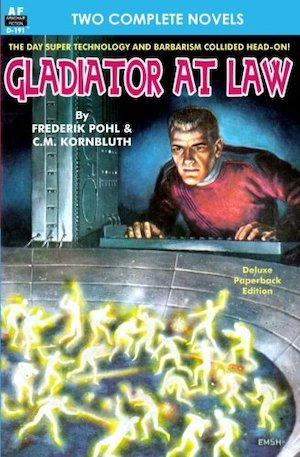
Thanks to the visionary guidance of corporate law firm Green, Charlesworth, the world of yesterday’s tomorrow is a utopian paradise. Those useful to the system are rewarded with luxurious GML bubble homes. Those who fail to deliver are consigned to suburban hell, where their squalor and misery provide useful motivation to workers who might otherwise shirk their responsibilities to Green, Charlesworth.
Norma and Donald Lavin own a quarter of GML. They would be part of the 1%, if only their brainwashed father could remember where he hid the stock certificates. As it is, they are trapped in Belly Rave slum. A lawyer might be able to help, but few lawyers would be foolish enough to take the case. The Lavins’ enemy is Green, Charlesworth and Green, Charlesworth owns the legal system. Luckily for the Lavins, and less luckily for attorney Charles Mundin, Mundin has just the right combination of expertise and desperation to take on the Lavins’ cause.
The Dueling Machine by Ben Bova and Myron R. Lewis (1963)
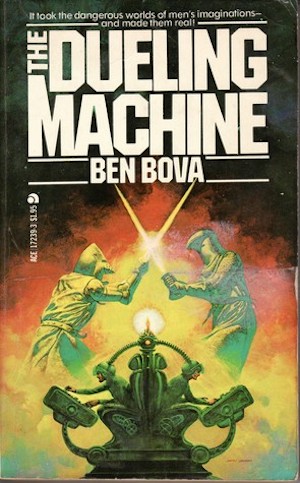
Court battles have the drawback of favouring those with the best lawyers. Actual battles have the drawback of ending in actual fatalities. Dr. Leoh’s marvelous Dueling Machine provides a third, lawyerless path to conflict resolution. The two sides of a legal or political dispute can replace battlefields and courts with a simulated fight in virtual reality. The Dueling Machine is risk- and lawyer-free. The conflicts are quite exciting as well.
Of course, someone always has to spoil perfectly good arrangements. Death in the Dueling Machine should be impossible, but Gladiator Odal has murdered several opponents in simulated combats. It’s up to Leoh, inventor of the machine, to find out how Odal’s trick works and how to put a stop to it.
“An Ornament to His Profession” by Charles L. Harness (1966)
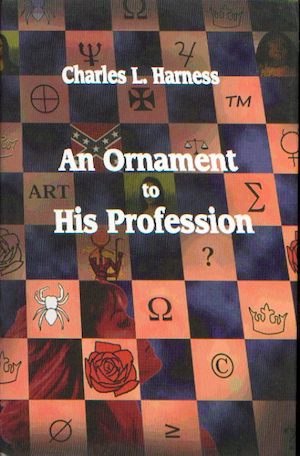
Lawyer Conrad Patrick was once a happy husband and father. Now he is a grieving childless widower, whose primary respite from the crushing despair that dogs him is his job in the patent department of a large corporation. He is desperate not to lose this distraction.
Fortunately his employers have more than delivered on the distraction front, considering the mounting difficulties Patrick must do his best to resolve:
- A predatory rival within the company is scheming to hire a competent secretary away from the patent offices.
- A crucial patent in which the company fortunes have been invested is based on a youthful joke and cannot stand up to close examination.
- Valuable employee John Fast is most insistent that Patrick draw up a contract between Fast and his Satanic Majesty. As is so often true of legal challenges, the devil is in the details.
Year Zero by Rob Reid (2012)
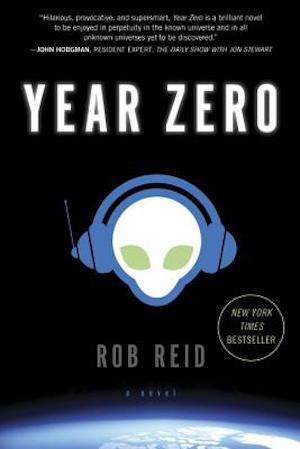
Earth may be a galactic backwater, but its natives excel at entertainment. All across the universe, aliens have enjoyed the products of human artistic labour, but without reimbursing the humans for any of it. Were copyright violations to be taken to court, potential costs and penalties would be astronomical. Perhaps it would be best to avoid the issue by simply killing everyone on Earth.
Or perhaps there is a better solution! It falls to puny human entertainment lawyer Nick (no relation to the Backstreet Boys) Carter to find it. Failure means the extinction of the human race, including Nick; thus, Nick is very highly motivated. Alas, by the time he is hired by aliens to tackle the case, the deadline for total annihilation is a mere two days away, and Nick is very much not the high-powered lawyer that the aliens believe he is.
Gamechanger by L. X. Beckett (2019)
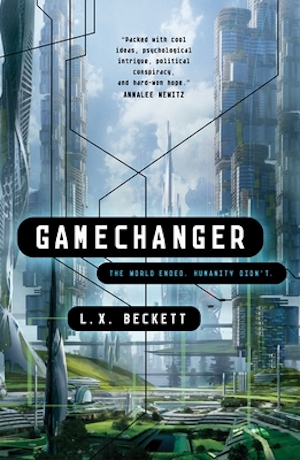
All it took to inspire comprehensive social reform was global disaster. Having nearly wrecked the planet with short-sighted, destructive habits, humans grudgingly instituted new conventions designed to ensure the mistakes of the past would not be repeated. Freshly minted lawyer Cherub “Rubi” Whitling intends to play a vital role in the new world order, assisting otherwise hapless clients to navigate tomorrow’s legal system.
Political agitator Luciano Pox is an especially difficult client, lacking as he does any significant grasp of social etiquette. His views may be valid but his means of expressing them only alienate those around him. Perhaps Pox is merely proof that social eptitude is highly variable. Interpol Special Ops Agent Anselmo Javier has another explanation. Javier believes Pox isn’t human, but a rogue AI (that fabled monster of 22nd-century fables). This absurd idea could be easy disproved as soon as Cherub meets her client the flesh. And yet, accomplishing this straightforward task proves curiously difficult…
***
SFF is filled with thrilling court and legal cases! No doubt you have your favourites passed over here (Mine, Little Fuzzy, didn’t make the cut because I have mentioned it in previous pieces). Comments are, as ever, below.
In the words of Wikipedia editor TexasAndroid, prolific book reviewer and perennial Darwin Award nominee James Davis Nicoll is of “questionable notability.” His work has appeared in Publishers Weekly and Romantic Times as well as on his own websites, James Nicoll Reviews and the Aurora finalist Young People Read Old SFF (where he is assisted by editor Karen Lofstrom and web person Adrienne L. Travis). He is a four-time finalist for the Best Fan Writer Hugo Award, is eligible to be nominated again this year, and is surprisingly flammable.











One thread in Lloyd Biggle’s Monument involves legal chicanery, and dealing with it.
In the numerous court scenes, lawyers do not argue their cases. They use programmed information packets about relevant precedent.
The judging machine evaluates each lawyer’s case in the light of the case load he presents.
When it announces a decision, the lawyers add new case-buttons to support their response to the last judgment.
The lawyer with the best set of case buttons wins.
Frank Herbert, The Dosadi Experiment – Gowachin law is a very strange minefield indeed.
I just read and enjoyed The Justice Of Kings by Richard Swan. It’s a fantasy story told about a Justice with minor magic who travels the empire making judgements and applying the law of the emperor. It’s told as a memoir of the clerk of the justice. Escalating conflict between the church and state. Kind of a politcal/legal thriller in a fantasy setting.
And, off course, Max Gladstone’s Craft Sequence — white-shoe necromantic lawyers who get paid in souls to manipulate reality through contract negotiations with divine LLCs.
Two sf courtroom dramas by H Beam Piper: “A Planet For Texans” and “Little Fuzzy”
Kate Wilhelm’s Death Qualified is a superb legal thriller and also SF.
Ditto for Robert J. Sawyer’s Illegal Alien.
The Demolition Man by Alfred Bester is surely the only work of fiction to feature a plot that turns on the Rule in Shelley’s Case.
The funniest short story I have ever read was William Tenn’s “Party of the Two Parts” in which a policeman of a race which reproduces by spore-pod explosion must decide whether or not to arrest an intelligent amoeba for selling pornography from his world to an Earthman who wants to use them as science illustrations. Glorious! Richard D Grant (not the sf writer but a fan who produced a bibliography of Avram Davidson back in the late 70’s) did a story with an amusing concept, The Return of Counselor-at-Law (I assume there was a story before the Return) which appeared in a Columbia University publication. In order to assure that both parties have equal representation, the prosecution and defense attorneys switch sides at the midpoint of a trial. In Marvel Comics / Marvel Cinematic Universe both Matt Murdock (Daredevil) and Jennifer Walters (She Hulk) are lawyers. Their professions are not throwaways, but integral to the plot of some stories. I don’t know how many science fiction writers are attorneys, but I know Michael A Ventrella is one (we just had him speak at the Science Fiction Association of Bergen County), though he does not write sf with a legal slant.
@1 I never could figure out why all the drama in Monument about adding the argument discs. Was it purely a status thing, that attorney’s got prestige by winning the case with fewer discs? Why not put have each attorney put everything relevant in at once? I guess there is some element of “disc 14 isn’t relevant to the case unless the opposing attorney puts in a reference to the such-and-such legal doctrine.”
Just going to second the recommendation of the Gladstone’s Craft sequence.
KIRK: I hope I’m not crowding you.
COGLEY: What’s the matter? Don’t you like books?
KIRK: Oh, I like them fine, but a computer takes less space.
COGLEY: A computer, huh? I got one of these in my office. Contains all the precedents. The synthesis of all the great legal decisions written throughout time. I never use it.
KIRK: Why not?
COGLEY: I’ve got my own system. Books, young man, books. Thousands of them. If time wasn’t so important, I’d show you something: my library. Thousands of books.
KIRK: And what would be the point?
COGLEY: This is where the law is. Not in that homogenised, pasteurised, synthesised —. Do you want to know the law, the ancient concepts in their own language, learn the intent of the men who wrote them, from Moses to the tribunal of Alpha Three? Books.
KIRK: You have to be either an obsessive crackpot who’s escaped from his keeper or Samuel T Cogley, attorney at law.
COGLEY: Right on both counts. Need a lawyer?
KIRK: I’m afraid so.
Heinlein’s The Star Beast has a fair bit of legal stuff in it.
“He will study some sound profession — the law, probably.”
Mr. Kiku’s brows went up. “Please, Mrs. Stuart,” he said plaintively. “Not that. I am a lawyer — he might end up where I am.”
@1: That was the first one I thought of; the short story (1961) is primarily about the law case, while the novel adds other lines — IMO a case where the expansion is actually better (not common), even though it leaves room for an all-too-conventional sex-role issue.
Harness was a patent lawyer, so it’s hardly surprising that he wrote more than one story with that frame; I do not recommend The Venetian Court as it piles sexism (blatant even for 1982) on top of implausibility (people found guilty of violating a patent have to drink cyanide right there in the courtroom — no appeal, no judgment of severity), but it is … notable.
ISFDB lists just 3 stories by Jonathan Brand; I couldn’t even remember his name or the story title, but I remembered that one of them was in The If Reader of Science Fiction, which means Pohl thought “Long Day in Court” was one of the better stories he’d edited for that magazine. (It’s not clear how much that means — ISTR him saying in The Way the Future Was that he would run a second-rate story in If instead of Galaxy rather than fail to buy something from a regular author — but I have fond memories of many of the stories in that book, and I also recall comments that If, which won three Hugos, was often more interesting than Galaxy, which didn’t win any under Pohl.) Also not recommended for current readers as the main case at hand is wifebeating in a culture which calls for it, but it fits the category and is one of the first I recall to suggest that judges need to at least understand cultures other than their own.
@10: a law procedure is a combination of fencing and poker; if you have some precedents unrevealed, you may be able to surprise someone with them in a future case.
Apparently the computerization of weighing precedents happened before computerization of researching them, which seems implausible (my first computer job, over 4 decades ago, was dealing with online information systems) but it’s the way Biggle (an academic musicologist rather than a practicing lawyer) built his universe.
See also the four Paul Sinclair novels by “Jack Campbell” (John Hemry) in the “JAG in Space” series about a military lawyer in Earth’s Space Force.
Melinda Snodgrass, who is a lawyer, wrote a science fiction trilogy, Circuit, under her own name and a fantasy trilogy, Linnet Ellery, under a pen name. She’s also famous for writing the popular Star Trek: Next Generation episode, “The Measure of a Man” about the Starfleet court case regarding Data’s right to self-determination.
John C.Wright’s Eschaton sequence opens with duelling lawyers armed with computerised weapons, in Count to a Trillion.
Thanks for posting this! I immediately thought of Christopher Brown’s books, especially Tropic of Kansas but also his two more recent books based in the same world, Rule of Capture and Failed State. One could describe them as a mixture of cli-fi/thriller/dystopia.
Christopher Brown’s near-future pre-apocalyptic novels Rule of Capture and Failed State feature lawyer Donny Kimoe, a smart and smart-mouthed advocate who uses legal maneuvering to salvage the remnants of a shattering (un)United States. Like any good attorney, Donny is mistrusted by everyone since his interest is in the idea of Law and not with their particular desires to bend it for their own ends.
Joseph Delaney often had legal issues in his stories. For example, “The New Untouchables” and “Brainchild”
Heinlein’s novella “Magic, Inc.” (aka “The Devil Makes the Law”) has a pretty heavy legal background, as does his story “Jerry Was A Man,” come to think of it.
Can I just check which stories involve literally weighing the legal documents brought by each side? You know, like in the picture there. :-)
I offer Isaac Asimov and Frederik Pohl’s “Legal Rites” – Wikipedia covers it.
I’ll second the mention of Piper’s Little Fuzzy. In addition to being a fun adventure story with cute aliens, it is a thoughtful look at how accurate and reliable lie detectors could impact jurisprudence.
Mack Reynolds had a number of stories looking at how gladiators and mercenary conflicts could be used to resolve disputes between corporations and nations. It takes a jaded view of the world to think this would be a better system than legal arguments, judges and juries.
What about Stoned Counsel by H.H.Hollis in Again, Dangerous Visions? Also, Battlefield Earth by L.Ron Hubbard has some good banking and legal shenanigans by the Earth folk against possible foreclosure and invasion.
My favorite legal SF story is from medieval Iceland. Njal’s Saga (which has significant fantasy elements) has a legit thrilling courtroom sequence in it.
Katherine Addison’s The Witness for the Dead is a good take on a rather different legal system. And what about Miles Vorkosigan in The Mountains of Mourning?
Oh, good picks @27.
John Hemry, who also writes now as Jack Campbell, wrote a JAGS in Space series, with A Just Determination as the first one. I liked the legal shenanigans, although the cases didn’t always integrate with the character development of the protagonist/legal eagle, so as novels they are a bit kludgy.
#8: It’s The Demolished Man, not Demolition Man. The latter is a very different movie.
Heinlein also has lawyers and the law in I Will Fear No Evil.
#29: I don’t want to derail the comments, but I wonder if more than two people (#8 and myself) did not notice that “Demolition Man” was the wrong title. It does involve crime and (improper) punishment, of course.
@13: I was trying to remember the title of “Long Day in Court”. It had the potential to become a legal version of James White’s Sector General stories, but IMO missed the mark.
I think IF tended to beat Galaxy among fans because that was where Pohl ran serials. IF was monthly, while Galaxy was every other month, so even three-parters would take 5 months to run and it’s really easy to forget what happened in something you read 2 months ago.
In K.J. Parker’s _Colors in the Steel_ the main character is a barrister. However, legal disputes in that world are resolved with swords – to the death with smallswords in most cases but divorce and inheritance cases are to first blood with a zweihander. While both parties agree to a dispute resolution carried out by expensive hired specialists, there is not much appeal to precedent or code beyond the formalities of the duel so I am not sure it quite fits this theme.
@23, Yes! I remembered Legal Rites clearly, especially the shocker ending, but I couldn’t remember the title!
Adam-Troy Castro has a series of stories and books about Andrea Cort, an advocate, that is, essentially a lawyer. She is a member, more or less, of the human diplomatic corps, and is often called upon to resolve issues between individual members of different species, which often have their genesis in different moral and/or religious customs. “With Unclean Hands” is a brilliant novella, and I’d start there; Emissaries from the Dead is the first of the novels starring Cort. Highly recommended.
I’m recalling a story, possibly so old as to be by Van Vogt, in which an idealistic judge is faced with the complete fallibility of a system in which the judge and the defendant duel — the defendant is allowed some sort of weapon if the panel thinks them not absolutely guilty, but supposedly a guiding force lets the right side survive. In practice, of course, it’s all a shuck; the odds of the defendant surviving are directly related to the armament they’re given (but are not good even if they get something serious, as judges practice while ordinary people can’t), but the judge concludes he has right on his side when nothing stops him mowing down the fellow judges who tried to disillusion him. Any guesses?
@24: note that “fracases” were also the -and-circuses of Reynolds’s Joe Mauser stories; they weren’t just for settling disputes.
@30: not me — I read it as it was intended rather than realizing it was off.
@35: Not Van Vogt, but Algis Budrys. I believe it is “The Executioner”. Originally, published in *Astounding Science Fiction Magazine* in 1956. Much reprinted and anthologised and in his collection *The Unexpected Dimension*. Interestingly its scientific content is a discussion of statistics. The story is set in what can be described as a sideways world. While not as ancient as Van Vogt’s earlier publishing history, but both writers do overlap in their literary careers.
That sounds right — it’s more a Budrys think-piece than a Van Vogt space opera.
I’ll leave the thread with an epigram from around that time. In “Operation Afreet” (part of the fixup Operation Chaos, which IIRC came up in another thread recently), Poul Anderson’s narrator discusses the changes various parts of a university saw when magic was dragged out of the shadows and systematized; he concludes “The law school was not much changed. Its work was never of this world.”
I’m tickled to learn that a lawyer (Melinda Snodgrass) wrote “The Measure of a Man,” one of my favorite ST:TNG episodes!
If folks here enjoy legal threads in near-future SF, my novels Division, Playback Effect, and Who include such. (In Division, a lawsuit must decide between the desires of conjoined twins, only one of whom wishes to take advantage of a radical new separation procedure. Playback Effect has fewer courtroom scenes, but revolves around an technology used in the criminal justice system to transform “an eye for an eye” into subjective reality. Who features a digitally stored person struggling to preserve her essential nature and taking part in a lawsuit to accomplish that goal,)
Man, I was sad not to see Diane Duane’s Stealing the Elf-King’s Roses on here. The main character is a lawyer, from a world where the Law works by calling Justice Herself into the courtroom and seeing the evidence clearly for Her to make a judgement and sentencing (which sometimes involves being turned into an animal). Things only get wilder from there.
Gasp! You missed my favourite (comedic) law book: Elf Defense by Esther Friesner. If you can’t use the law to take on the King of Elfhame, what good is it?
I’m throwing Tara of Three Parts Dead (The Craft Sequence by Max Gladstone) into the hat!
Just re-read “Gladiator at Law” for the first time since the ’70s. It was the original Galaxy serial which differed in places from the book version. It was much more fun than I thought it would be. Pohl and Kornbluth wrote well. They had a grasp of dialogue that sounded like real human interaction that set them apart from many writers in the period this book was written. The book is a little heavy on corporate inside baseball and has some creaky plot and character stuff but it held my interest all the way through.
Heinlein liked courtroom stuff. Another of his with a courtroom element is “Citizen of the Galaxy” where the main character, under the guidance of the mentor that appears in most of the Heinlein juveniles, ends up in court to prove his identity.
One of my favorite bits in the (Hugo Finalist for Best Series!) World of the White Rat by Ursula Vernon/T. Kingfisher is the Temple of the White Rat, which maintains a whole staff of lawyers – among other things.
Michael Stackpole’s The Krytos Trap, a Star Wars novel, has a court-martial as one of its central plot threads (one of the protagonist pilots is accused of murdering another). It was one of the books that wound up getting me seriously considering law school, actually. (Thanks Mike, look where I ended up…)
All these are intriguing, but despite using the term SFF, I’m seeing all science fiction and no fantasy! No mention of The Craft Sequence? It’s a law firm made up of wizards!
Here’s book 1 on GoodReads: https://www.goodreads.com/book/show/44401660-three-parts-dead?ac=1&from_search=true&qid=hcHTvX51Ex&rank=2
Elizabeth Moon’s Once a Hero begins with a formal Navy Court Martial.
Ensign Esmay Suiza was the highest surviving officer after:
The Captain led a mutiny in the face of the enemy so
The lower rated officers led a mutiny against the traitor Captain.
The Navy can’t let any mutiny go without a formal Court Martial.
So they try the mutineers who opposed the mutineers.
It reads like a legal trial to me.
A couple of Bujold’s Vorkosigan stories end with memorable trials: The Warrior’s Apprentice and A Civil Campaign. Others sometimes involve the passing of a legal judgement or legal maneuvering, but outside the courtroom.
Between that series and the ones set in the world of the five gods, she absolutely dominates my bookshelf and Kindle.
Alexandra Rowland’s Conspiracy of Truth starts with Chant dismayed to discover that he’s just added obstruction to the witchcraft charges by trying to defend himself. I rather like the uber-competent and world-weary advocate Consanza, but Chant and his machinations to get himself out of trouble are the main story.
Lee & Miller’s Liaden series also has some interesting legal shenanigans among the alien turtles, space assassins and merchant traders. Liad is governed by a Code of Conduct, and they have a class of lawyer-accountants called qeadra including the wonderful Mr dea Guass.